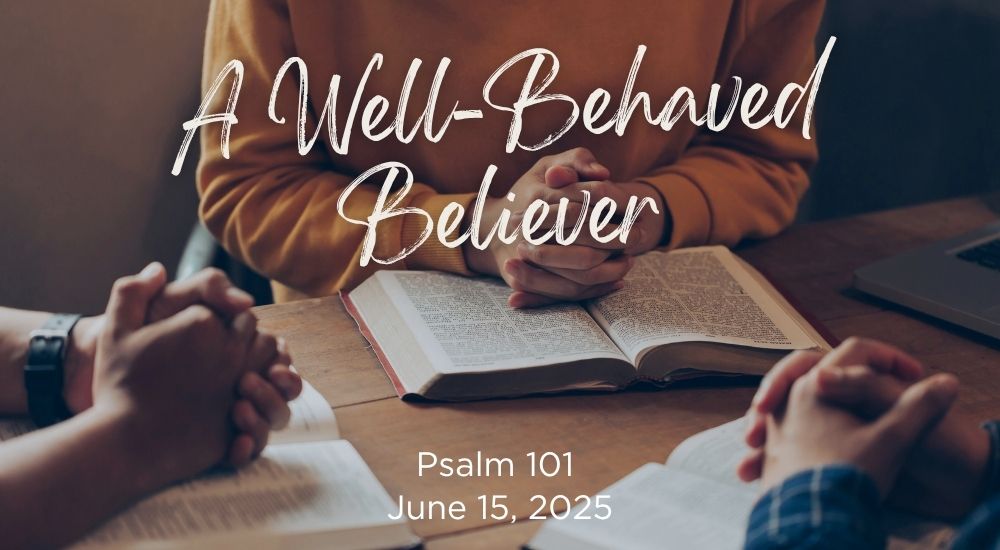
There are two kinds of psalms: psalms of praise and psalms of practice. An example of the former is Psalm 100 – full of praise and thanksgiving; and an example of the latter is Psalm 101, full of resolutions made by David at a time when he was about to become king of Israel. They all have to do with daily life and conduct, and that is why this psalm is so practical.
Psalm 101:2: “I will ponder the way that is blameless. Oh when will you come to me? I will walk with integrity of heart within my house”
- Grammatical Usage: “blameless” or in Hebrew, “bə·ṯām-“ meaning, “uprightness”; “walk with integrity” or “’aś·kî·lāh” meaning, “prudently”.
- Literal Interpretation: I’m finding my way down the road of right living, but how long before you show up? I’m living honestly and uprightly, and I’m doing it at home, where it counts.
- Contextual/Comparison: God keeps His Word: God continually uses His Word. Eight times in this Psalm David says, “I will” which is a conscious decision about behavior. The Psalm outlines the well-behaved believer:
- The well-behaved Believer has a spirit of praise.
A life that is filled with praise to God – v. 1. The important thing to notice is that the psalmist sings just as much of “love” as he does of “justice.” Naturally speaking, it is far easier to sing of love than of justice. It is much easier to sing when the sun is shining and all is going well; yet the grace of God enables His children to have “songs in the night” (Psalm 77:6) – even if they are in prison with their backs bleeding (Acts 16:25)! God gives His people the ability to glorify Him in the fires (Isaiah 24:15) – indeed, at all times (Psalm 34:1). When life is pleasing we say, “Isn’t God good?” When trouble comes, we tend to forget to say it; but Romans 8:28 demands that we should say it even then. Look up Philippians 4:6-7.
- The well-behaved Believer lives consistently in the home.
Perhaps David had found, as we have, that the hardest place to live a sweet and consistent Christian life is in the home (v. 2). Home is the place where we are apt to throw off restraint. Look up and cross reference this with Titus 2:5. If we are careless and undisciplined in our living at home or where we work, the Word of God is “maligned” or exposed to reproach. There is a very searching question asked in 2 Kings 20:15.
- The well-behaved Believer refuses to regard iniquity.
See v. 3. We cannot help seeing “worthless” or “vile” things, but it is a very different matter deliberately and willingly to set them before our eyes (Psalm 66:18; Romans 13:14). How necessary it is for us to make the resolve of v. 3, and to apply it to the literature we read, the places we go to, the people we associate with and the thoughts of our heart! We are called unto holiness (2 Corinthians 7:1); and what have we to do with wickedness (2 Timothy 2:19).
- The well-behaved Believer is separate from the spirit of this evil age.
See v. 3 (last part). The deeds of faithless men David hates, and he resolves that they will not cling to him. “I’ll not let a worldly spirit get hold of me!” It is so easy for a Christian to be like a worldling: by indulging in the world’s questionable pleasures, using the world’s corrupt forms of speech, adopting the world’s debased standards, and so on. The call of God is to separation – 2 Corinthians 6:14-18. Like Daniel, we need a sense of purpose in this – Daniel 1:8!
- The well-behaved Believer is fully surrendered to the Lord.
The word “perverse” in v. 4 means ‘self-willed’. Are our wills bent on pleasing self, or bent on pleasing God? Do we want to go our way, or His way? Look up 2 Corinthians 5:14-15 (especially v. 15). How is it with you? Are you living for Him or for yourself? Is it (in the words of the hymn) “some of self, and some of Thee”, or “none of self, and all of Thee”?
- The well-behaved Believer cultivates friends of whom God approves.
At the end of v. 4 (KJV), the psalmist says, “I will not know a wicked person”; that is, “I will not make close friends of those who do not love the Lord.” Our life and testimony for Christ can be made or marred according to the kind of friends we choose. What kind of friends should we choose? V. 6 gives us the answer! Cultivate the friendship and fellowship of those who honor God, love the Lord Jesus and make much of the house of God, the Word of God and the service of God. For those who do not God shall not acknowledge (v. 7).
- The well-behaved Believer has a controlled tongue.
In v. 5, David tells us he has determined not to be a party to slander – false and malicious reports. Before we pass on that news, we should ask ourselves:
Is it true? Is it necessary to say it? Will it help to say it? Will it harm?
Will it glorify God? Am I helped by saying it? Is it my business, anyway?
What, then, is the key to the well-behaved Christian life? The answer is in v. 2:
-
- There must be a determined resolve – “I will be careful to lead a blameless life…”
- There must be a deep consciousness that it is only possible to be well-behaved as the Lord Himself comes and dwells within us, empowering and enabling us.
- Conclusion: Am I committed to biblically well-behaved life?
